
14 minute read
Faculty Updates
NEW FACULTY
In August, Sumiko Anderson was hired as an assistant professor (clinical) in the College. She is a licensed clinical social worker, who spent the last 21 years with the Department of Workforce Services (DWS), most recently as a licensed clinical therapist supervisor. She has also worked as an associate instructor in the College since 2018.
Stephanie Bank, assistant professor (lecturer), has maintained her own private practice since 2003, specializing in a variety of issues including anxiety, grief, and parenting. When Ms. Bank joined the BSW Program as an adjunct instructor in 2015, teaching quickly became her new passion. She has embraced technology and is always looking for new ways to help students get the most out of their education.
Emily Bleyl began her role as assistant professor (clinical) in April. She has served Utah’s social work community for over 25 years as an educator, clinician, and administrative leader. Her primary interests are the intersection of social work practice and policy, field education, ethics, and professional socialization.
Tonie Michelle Hanáázbaa’, assistant professor (clinical), has significant experience in the field of substance use disorders, mental health, and trauma-informed care. She is passionate about social justice; issues of power, privilege, and oppression of historically marginalized populations, and helping historically underrepresented students in higher education succeed in the classroom and field education. Research Assistant Professor Mi Seong Kim comes to the U from Texas Tech University, where she taught and conducted research in the College of Human Sciences. Her current research focuses on: the contextual frame of elder mistreatment, coping and resilience of older adults exposed to elder mistreatment, and how elder mistreatment is sharing time and space with other types of family violence.
Assistant Professor Elizabeth Siantz takes a systems-level approach to research that addresses health disparities among persons with serious mental illness. She will join the College in January of 2021, after completing a post-doctoral fellowship in the Department of Family Medicine and Public Health at the University of California San Diego.
Tamber Snarr-Beesley joined the practicum office as an assistant professor (clinical) in January, but worked within the College as an adjunct faculty member, field advisor, and Practicum Advisory Committee member for several years before that. She brings with her a wealth of experience in medical social work, grief and loss, and social work education.
—Martell Teasley, Dean
School Social Work: The Heart of a Profession
This fall, the College of Social Work added a School Social Work Career Path to its offerings. This sequence consists of six credit hours of course work, in addition to a school-based practicum in a student’s first or second year in the MSW Program. The career path is designed to orient social workers to the unique challenges of school social work, with specialized training in counseling, assessments, and interventions that center the social and emotional learning of K-12 students. Due to the particular demands of the school context, school social work students will learn to work at the mirco, mezzo, and macro levels simultaneously.
There’s a lot to deal with in this field. The needs of young students vary from basic need fulfillment (like getting breakfast), to help dealing with trauma, to feelings of isolation, to stress over family adversity and beyond. To an outsider, it can sound overwhelming. How do you take care of so many needs? Richie Landward, one of the chairs of the School Social Work Career Path and a former school social worker, emphasized the importance of specialized education and experience. “The cause for being overwhelmed is a gap in training,” he explained. “A well trained social worker can make organization out of chaos.” He added, “Is it emotionally exhausting? Yes. But it’s more rewarding—times ten more—than it is exhausting.”
When asked why he does this work, Prof. Landward’s passion was palpable. “The biggest impact social workers can make is in schools with kids and families. If you look at Jane Adams, what she was about when she founded social work, it wasn’t about micro work; it was about poverty and oppression, social justice and equality. And that’s what school social workers do—we help kids succeed. And we help them overcome those challenges of poverty and inequity and oppression and discrimination. And we make it right in the school. We do that through systematic work, policy work, creating processes and programs that are fair and equitable. It changes lives.”
Assistant Professor Tasha Seneca Keyes, also a former school social worker and the other chair of the School Social Work Career Path, added, “What Rich is talking about is system change. We talk about using system theory in our profession all the time. But it’s in schools that we’re really able to do system change.” She added, “School social work is at the heart of our profession.”
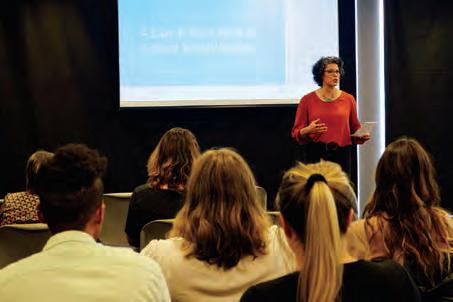
“A well trained social worker can make organization out of chaos.” He added, “Is it emotionally exhausting? Yes. But it’s more rewarding…”
2020 GRADUATES: STUDENT SPOTLIGHTS

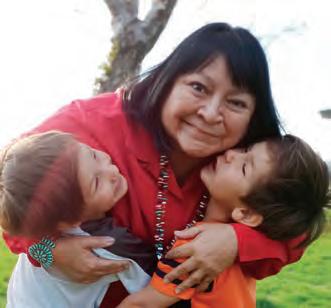

Watch the College of Social Work’s 2020 Virtual Graduation Ceremony at: bit.ly/usocialworkgrad20
Ebony Miller completed her BSW degree as an online student in Fernley, Nevada. A scholarship and award recipient, Ms. Miller excelled academically while keeping busy within the College and her town. Along with raising a family, teaching fitness and hip hop classes, and volunteering as a victim advocate, she participated in the Undergraduate Research Opportunities Program, researching eyewitness identification with Professor Joanne Yaffe. Ms. Miller is grateful to have worked with Dr. Yaffe, saying that “she pushes me to go past what I think I can do.” Ms. Miller has pushed past what she thought she could do since age 13 when she began taking care of her two younger siblings after losing their parents. Her childhood experiences taught her to “understand someone’s story instead of judge, and forgive and support instead of attack or criticize.” Ms. Miller plans to earn her MSW, then become a juvenile probation officer or marriage and family therapist.
Matilda Yellowhorse took the long way to an MSW degree. She worked in a variety of jobs, striving to provide for her and her son, but when he moved from home, Ms. Yellowhorse thought it was time to go back to school. One job that really left a mark was her work as a teacher’s assistant for Native American students. She wanted to do more to help them and their families. “I always felt like something was missing,” she said. “I wanted greater confidence in helping them.” After graduating in the spring, Ms. Yellowhorse started working with Sacred Circle Health Clinic as a clinician and health educator to help Native American families in the Salt Lake City community and on the Ibapah, Utah reservation.
Just before beginning her PhD Program, Anne Baker hiked 550 miles of the Pacific Crest Trail (PCT)—a 2,650-mile trek from Mexico to Canada. Through an arrangement with her mentor, each summer, she took a break from her classes and her work in the College’s C-MIIND lab to hike the PCT. Usually covering about 30 miles a day, she spent much of the often solitary time listening to audiobooks, the birds, or her footsteps. She thought about her life and values and sometimes her research area—pain. “This is not a pain-free process by any means, so I definitely spent some time thinking about pain,” she said. In 2019, she felt overwhelmed as she finished her third and final 1,400-mile section of the PCT and crossed into Canada. “It was joyful and I felt incredibly proud,” she said. A year later, in August of 2020, she reached another major milestone, graduating with her PhD and moving on to a postdoc position at the Duke University School of Medicine.
Launching Telehealth Care— from Frantic to Familiar IN THE MIDDLE OF DIFFICULTY LIES OPPORTUNITY. –ALBERT EINSTEIN
The College of Social Work Community Advisory Board (CAB) held its final 2019-2020 meeting on Zoom. It was mid-April and most of us were still adjusting to the virtual world into which we’d plunged weeks earlier. The dean had much to share on the College’s swift move to online classes and the dramatic adjustments to practicum placements. The College’s dedicated community advisors—a mix of alumni and non-alums who share a collective interest in social work and community service—listened attentively and shared valuable first-hand experiences from their respective organizations. Clearly, the learning “curve” was a fast and jagged line headed up and off the chart.
As they spoke of their own challenges and successes, an idea emerged for a CAB-led webinar series that would provide a venue for sharing lessons learned, responding to a growing list of questions, and seize the opportunity to expand and improve telehealth care moving forward.
Within weeks, board members Tammer Attallah, Shawn McMillen, Clifton Uckerman, Janet Spafford Wilson, and Rebecca Mabe, along with their co-workers and community partners, planned and launched a College-supported, three-part webinar series called “Talking Telehealth.” Telehealth Technicalities focused on platform options and guidelines for providing online care; Telehealth Techniques addressed ways to provide quality care screen-to-screen, rather than face-to-face; Telehealth Tomorrow considered where we could and should go with a therapy that was gaining acceptance, serving some clients particularly well, and opening electronic doors that had seemed tightly locked mere weeks earlier. These webinars aimed for dialogue rather than definitive answers to telehealth care.
Mr. Attallah, who moderated two of the webinars, was excited to be part of the effort and pleased with how engaged attendees were. “We heard about some really creative approaches to telehealth care,” he said. “Providers are being incredibly thoughtful about how to adjust traditional approaches to these new treatment modalities.” Mr. McMillen agreed, adding, “Many organizations faced a ‘Fire, Ready, Aim’ approach to telehealth in the pandemic. The webinars provided an opportunity to consider what the future might hold.”
Recordings for these webinars, other virtual webinars since May 2020, and registrations for upcoming webinars are available at: socialwork.utah.edu/events.
Tammer Attallah Shawn McMillen “Many organizations faced a ‘Fire, Ready, Aim’ approach to telehealth in the pandemic. The webinars provided an opportunity to consider what the future might hold.”
Bringing Social Isolation into Focus
A fan of National Geographic from the time he was a child, Charles Hoy-Ellis, assistant professor in the College of Social Work, was gobsmacked when they contacted him about contributing to one of their articles. Aware that their pieces tend to focus on natural and hard sciences, Dr. Hoy-Ellis was heartened to see the magazine tackling the “softer” issue of social isolation in older LGBTQ+ adults. “It’s important to reach the broader public because at the end of the day, it’s the broader public that is most impacted by the issue,” he said. “It’s not hard to imagine a random reader who knows an older adult who is socially isolated but doesn’t recognize that they are. Maybe reading an article like that might prompt them to spend more time with that person. As important, if not more so, is an isolated older adult reading the piece. Invisibility is part and parcel of social isolation. An isolated older adult might think that ‘they are the only one.’ Just to know that one is not the only one can be empowering.”
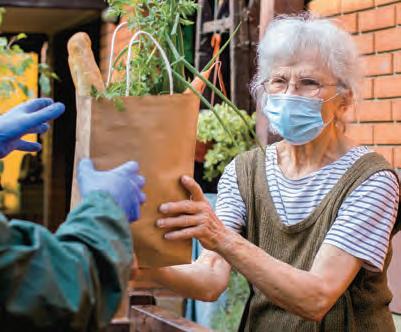
A New Generation of Philanthropy
Kenzo Okazaki
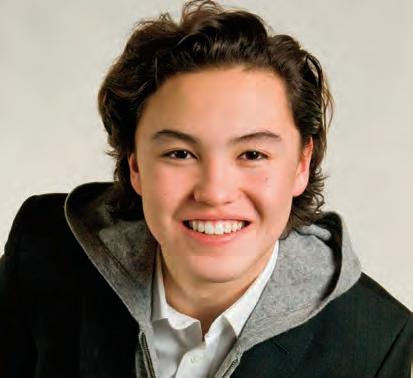
Kenzo Okazaki’s generous support of College of Social Work scholarships strikes familiar chords—he speaks eloquently of a strong family legacy, a deeply ingrained belief in the value of education, and a crystal-clear commitment to philanthropy. It is a sincere and seasoned message for someone who just turned 21.
Kenzo is a rising senior at Middlebury College in Vermont who will graduate in May 2021 with a double-major in history and philosophy. He represents the third generation of Okazaki family members to support the College of Social Work—following grandparents Edward and Chieko Okazaki and parents Ken and Kelle Okazaki who, over the course of nearly 30 years, collectively inspired and supported the Edward Yukio Okazaki Endowed Scholarship and Award and the Edward Yukio and Chieko Nishimura Okazaki Community Meeting Room. All of this reflects long ties to the College, and to higher education in general.
Kenzo appreciates both connections. “I was brought up to believe in education for me personally, but also that there’s a responsibility to support others in education,” he says. The message—absorbed through family lines and many family conversations—was that, through education, there are opportunities to make life better for yourself and also for others. “My grandparents shared that message with my father and uncle, and it has been passed down to me as well.”
Although his grandfather died well before Kenzo was born, the younger Okazaki appreciates that Edward Okazaki’s work in the social work arena inspired the family. “He’s always been a role model for me,” Kenzo notes. “He encouraged success not just for one’s self, but felt that extended to a responsibility for others and the community.”
So, as Kenzo entered college and began earning his own money and joining family philanthropy discussions, he became excited to do something that would be a credit to his grandfather. Kenzo was particularly interested in supporting underrepresented groups, in light of the discrimination his Hawaiian-born grandparents of Japanese descent faced when they arrived in Utah 70 years ago. Their history directly influenced his own keen focus on increasing access to education for those facing unique and sometimes formidable circumstances.
Kenzo’s contribution to social work student scholarships accomplishes this goal and more. His support
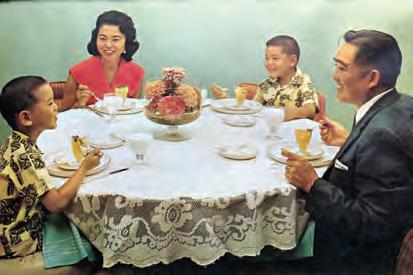
Kenzo’s grandparents, Edward and Chieko Okazaki, with their sons, Kenzo’s father and uncle.
is part of a uniquely engaging matching opportunity through the Undergraduate Studies Community Partners Scholarship program—a program that provides students with scholarships and pairs them with mentors as they complete their junior and senior years of study. “Having met two recipients on paper,” Kenzo observes, “it gives me lots of hope.” He respectfully adds, “To see them get through their challenges and succeed, with the goal of serving others, is personally inspiring.”
In addition to forging a new scholarship path within the College of Social Work, Kenzo has also become increasingly involved in family discussions regarding the Edward Yukio Okazaki Endowment. His parents’ support for this legacy honor has inspired him and shaped his own long-term philanthropic goals. “Through my dad, I developed this sense of responsibility—it was an important lesson for my dad to lead the way.” Of Kelle Okazaki, Kenzo says, “My mom is one of the most generous people I know.” His mother recently made a directed gift to the family’s endowment through her business; Kenzo happily stepped up to help write the requisite letter to the company to coordinate the contribution. Kenzo explains that his mother “was very close to my grandmother. She wants to support my dad with this endowment and this was an opportunity for her to do so directly.”
Kenzo believes this shared family value of philanthropy would be important to his grandparents. For his part, he thinks that seeing the impact their family support can have serves to increase their commitment as a whole to social work scholarships. “In social work, the scholarship allows for direct support of students— but it also extends to those they serve and so supports people working to improve the well-being of society in general.” Kenzo concludes, “As much as on paper it’s me and my family giving something back, it is a great privilege to do something that’s doing so much good. We feel lucky to have this program.”
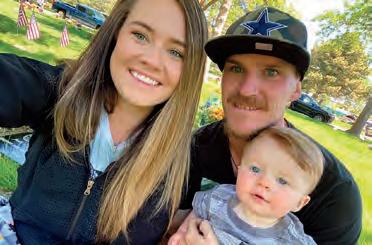
A LOT OF HELP FROM OUR FRIENDS Each spring, the Edward Yukio Okazaki Award in the College of Social Work is given to a graduating MSW student for demonstrated achievement and professional promise in gerontology. In 2020, amidst the chaos of quarantines and aftershocks, as the celebratory dinner was cancelled and commemorative plaques simply mailed—Ken, Kelle, and Kenzo Okazaki generously increased the monetary honor associated with their award—twice! The initial change came in response to news of how helpful and encouraging the awards would be this year; days later, they increased the honor again when they learned recipient Natasha Fjeldsted and her spouse, parents of a six-month old, both lost their jobs as the pandemic raged.
“I was ecstatic to receive this meaningful award,” said Ms. Fjelsted. “I am incredibly grateful to the Okazaki Family for increasing the funds associated with this award—they were critical to helping us navigate the first month of the pandemic.” For their part, Ken, Kelle, and Kenzo Okazaki were glad to know their support truly made a difference.




